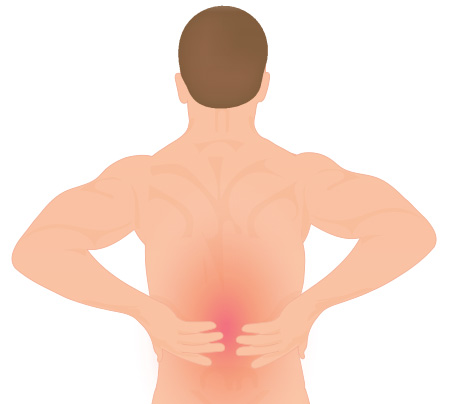 Low back Pain is extremely common and can affect 4 out of 5 people at some point in their life. It is rarely concerning and 98% of people will fully recover.
Low back Pain is extremely common and can affect 4 out of 5 people at some point in their life. It is rarely concerning and 98% of people will fully recover.
Symptoms may include:
- Pain in your lower back which may radiate to your buttock or leg.
- Tension / spasm in the muscles of your back.
- Altered posture or difficulty moving your back normally.
- Less commonly: pins and needles, numbness or weakness in one or both legs.
Be reassured – severe pain doesn’t necessarily indicate a serious problem. Pain does not always indicate harm or damage.
The following advice can help ease symptoms:
- Pain medication. Speak to your local pharmacist or health care professional about taking regular medication.
- Heat packs.
- Change position regularly and find a position which helps relieve symptoms.
- Stay active!
- Return to normal activities as quickly as pain allows.
- Fear can cause a barrier to recovery. Being positive improves quality of life and can improve outcome!
- Complete the exercises shown regularly throughout the day. Repeat as many times as you are able.
A selection of exercises for back pain can be found on NHS Inform.
Stay Positive!
Keeping active is an essential part of your treatment. It is important to keep your lower back moving whilst you recover to prevent stiffness and help you improve faster. Long periods of inactivity can slow down your recovery.
Being physically active throughout your recovery will:
- Prevent recurrence of the problem.
- Maintain current levels of fitness.
- Keep muscles and joints flexible.
It is recommended that you stay at work or return as quickly as possible during your recovery. You do not need to be pain or symptom free to return to work.
Try to stay positive! Remember, most back pain settles with time…
Occasionally low back pain can be a sign of an underlying condition. If your symptoms persist or worsen, despite following the advice in this leaflet, please discuss with your GP or physiotherapist.
In extremely rare circumstances low back pain can cause Cauda Equina Syndrome. This would be treated as an emergency and you should attend the Emergency Department as soon as possible. The symptoms are detailed here.
More information about back pain and treatments can be found on NHS Inform.

